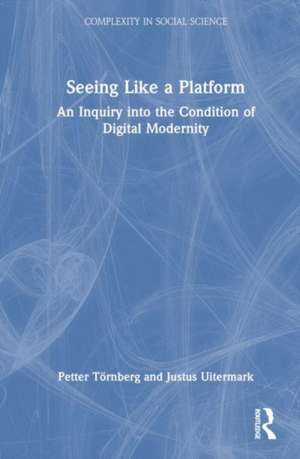Seeing Like a Platform: An Inquiry into the Condition of Digital Modernity: Complexity in Social Science
Autor Petter Törnberg, Justus Uitermarken Limba Engleză Paperback – 2 ian 2025
Seeing Like a Platform explores the history, meaning and far-reaching consequences of this epistemological shift. From social movements to Wikipedia, from digital platforms to city planning, from social science to media, society is being redefined by ideas from complexity science. While complexity offers a vision of a self-organized society freed from hierarchies and overbearing bureaucracies – it simultaneously enables new forms of domination and control.
Through theoretical reflections and case studies, Seeing Like a Platform offers an inquiry into digital modernity. Accessibly written and broad ranging, it is essential reading for scholars, students, and practitioners in fields such as sociology, political science, urban studies, and technology studies. It will also interest anyone keen to understand the profound impact of digital technologies on governance, social organization, and everyday life.
| Toate formatele și edițiile | Preț | Express |
|---|---|---|
| Paperback (1) | 309.16 lei 3-5 săpt. | +14.48 lei 4-10 zile |
| Taylor & Francis – 2 ian 2025 | 309.16 lei 3-5 săpt. | +14.48 lei 4-10 zile |
| Hardback (1) | 1053.16 lei 6-8 săpt. | |
| Taylor & Francis – 2 ian 2025 | 1053.16 lei 6-8 săpt. |
Preț: 309.16 lei
Nou
Puncte Express: 464
Preț estimativ în valută:
59.17€ • 61.54$ • 48.84£
59.17€ • 61.54$ • 48.84£
Carte disponibilă
Livrare economică 25 martie-08 aprilie
Livrare express 08-14 martie pentru 24.47 lei
Preluare comenzi: 021 569.72.76
Specificații
ISBN-13: 9781032354330
ISBN-10: 103235433X
Pagini: 184
Ilustrații: 18
Dimensiuni: 156 x 234 x 12 mm
Greutate: 0.24 kg
Ediția:1
Editura: Taylor & Francis
Colecția Routledge
Seria Complexity in Social Science
Locul publicării:Oxford, United Kingdom
ISBN-10: 103235433X
Pagini: 184
Ilustrații: 18
Dimensiuni: 156 x 234 x 12 mm
Greutate: 0.24 kg
Ediția:1
Editura: Taylor & Francis
Colecția Routledge
Seria Complexity in Social Science
Locul publicării:Oxford, United Kingdom
Public țintă
General and PostgraduateCuprins
1. Introduction
2. The social science of complexity
3. Complex cities: Longing for Wikitopia
4. Complex bureaucracies: Self-organization in Wikipedia
5. Complex media: The epistemology of digital capitalism
6. Complex contention: Anonymous’ power dynamics
7. Digital Platforms: Complexity and power in the digital economy
8. Conclusion: The biopolitics of Artificial Intelligence
2. The social science of complexity
3. Complex cities: Longing for Wikitopia
4. Complex bureaucracies: Self-organization in Wikipedia
5. Complex media: The epistemology of digital capitalism
6. Complex contention: Anonymous’ power dynamics
7. Digital Platforms: Complexity and power in the digital economy
8. Conclusion: The biopolitics of Artificial Intelligence
Notă biografică
Petter Törnberg is Assistant Professor in Computational Social Science scholar at the University of Amsterdam. He studies the intersection of AI, social media, and politics, using computational methods and digital data for critical inquiry. His most recent book is Intimate Communities of Hate: Why Social Media Fuels Far-Right Extremism (with Anton Törnberg).
Justus Uitermark is a geographer and sociologist at the University of Amsterdam. He holds a chair in Urban Geography and directs the Amsterdam Institute for Social Science Research. Uitermark has written widely on cities, social movements, and digital platforms. His books include On Display: Instagram, the Self, and the City (with John Boy), Cities and Social Movements (with Walter Nicholls), and Dynamics of Power in Dutch Integration Politics.
Justus Uitermark is a geographer and sociologist at the University of Amsterdam. He holds a chair in Urban Geography and directs the Amsterdam Institute for Social Science Research. Uitermark has written widely on cities, social movements, and digital platforms. His books include On Display: Instagram, the Self, and the City (with John Boy), Cities and Social Movements (with Walter Nicholls), and Dynamics of Power in Dutch Integration Politics.
Descriere
While industrial modernity saw society as a machinery to be designed according to detailed blueprints, digital modernity views society as organic and alive, to be herded and nudged through digital infrastructures, AI, and algorithms.This book explores the history, meaning and far-reaching consequences of this epistemological shift.









